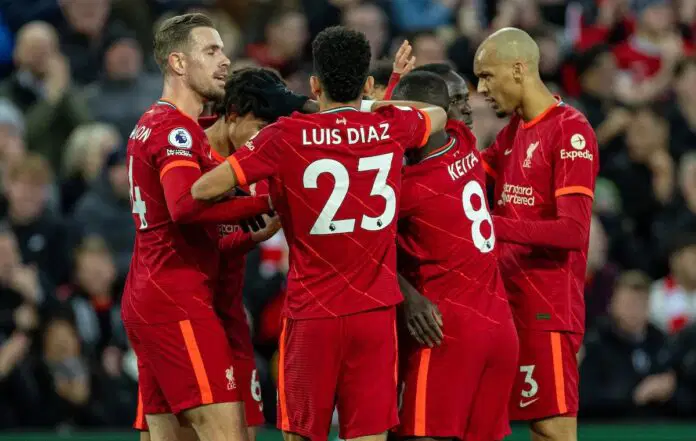In the world of football, few topics ignite debate as fervently as the use of VAR (Video Assistant Referee) and the contentious decisions that often follow. Recently, Chelsea found themselves at the center of this controversy after a match that saw their goalkeeper, Robert Sanchez, involved in a collision with Liverpool’s Curtis Jones. Following the incident, pundit Jamie Carragher voiced his opinions, suggesting that Chelsea were “fortunate” not to concede a second penalty despite VAR overturning the initial decision.
The clash between Chelsea and Liverpool was marked by high stakes, with both teams aiming for crucial points in a competitive season. The pivotal moment came when Sanchez collided with Jones, resulting in a moment of chaos within the penalty area. Initially, the referee pointed to the spot, awarding Liverpool a penalty, which would have put Chelsea in a difficult position. However, following a review by VAR, the decision was overturned, much to the relief of Chelsea fans.
Carragher, a former Liverpool defender and now a prominent football analyst, took to the airwaves to express his views on the incident. He argued that Sanchez’s challenge on Jones was reckless enough to warrant a penalty, suggesting that the goalkeeper did not make adequate contact with the ball. According to Carragher, this lack of control over the situation meant that Chelsea escaped a potentially game-altering penalty decision.
The introduction of VAR has transformed the landscape of football, aiming to reduce clear and obvious errors in officiating. However, its application has often been met with criticism and confusion. In this instance, VAR intervened to overturn the referee’s on-field decision, sparking debate about the criteria used to determine the appropriateness of such interventions.
Carragher’s stance highlights the ongoing debate about VAR’s effectiveness and consistency. Many fans and analysts share concerns regarding the subjective nature of decisions made by VAR officials. The inconsistency in rulings can create frustration among supporters and players alike, as it often feels that the interpretation of rules varies from one match to another.
In his analysis, Carragher emphasized that while VAR aims to improve fairness in football, it can also complicate matters. He noted that the technology is only as effective as the people operating it, and the guidelines for making decisions remain somewhat ambiguous. In the case of Sanchez and Jones, Carragher felt that the contact was significant enough to merit a penalty, arguing that Sanchez’s inability to secure the ball effectively put him in a precarious position.
“Let’s be honest,” Carragher stated. “Sanchez didn’t get enough of the ball. The way he approached the situation was reckless. In a high-stakes match like this, decisions like that can change the outcome of the game.” His comments resonated with many who watched the match, reigniting discussions about the standard of officiating in critical moments.
For Chelsea, the incident provided a temporary sigh of relief. Maintaining a clean sheet is vital for any team aiming for success, and escaping a second penalty was a significant boost. However, Carragher’s comments linger, as they reflect the precarious nature of relying on VAR for crucial decisions.
On the other hand, Liverpool fans and players expressed frustration at the overturned decision. For a team seeking to reclaim its status among the elite, every penalty opportunity is crucial. The notion that they could have been awarded a second penalty added to the tension surrounding the match and the ongoing rivalry with Chelsea.
This incident is not isolated; it mirrors the numerous contentious calls that have defined the current season. As teams jostle for position in the league, each point matters immensely. Chelsea and Liverpool are both clubs with rich histories and passionate fanbases, which heightens the stakes of every encounter.
In a season where every decision can influence title races, relegation battles, and European qualification spots, the scrutiny of refereeing decisions becomes magnified. Carragher’s comments underscore the pressure that officials face and the need for clarity in decision-making processes.
Reactions from fans have been mixed, with many taking to social media to voice their opinions on Carragher’s analysis and the VAR decision. Supporters of both clubs engaged in heated debates about the fairness of the overturning of the penalty, with some believing that VAR should have upheld the initial decision while others agreed with Carragher’s assessment.
This incident serves as a reminder of the emotional investment that fans have in their teams. Football is more than just a game; it is a source of identity, pride, and community for millions. Decisions made on the pitch, especially those involving penalties, can significantly impact the emotional state of fans and the narrative surrounding their clubs.
As the season progresses, the scrutiny of VAR will likely continue. The debate surrounding its effectiveness and the consistency of officiating decisions is unlikely to fade. Football governing bodies face pressure to refine the technology and the guidelines that dictate its use.
For Carragher, the conversation must extend beyond just one incident. He believes that a broader examination of VAR’s implementation is essential for improving the overall quality of officiating in football. “We need to have a serious discussion about how we want to use technology in our sport,” he remarked. “It can be a force for good, but we have to ensure that it’s applied consistently.”
The collision between Robert Sanchez and Curtis Jones, and the subsequent VAR decision, has reignited the debate surrounding officiating in football. Jamie Carragher’s assertion that Chelsea were fortunate not to concede a second penalty reflects a broader concern about the standards of officiating and the role of technology in the sport.
As Chelsea and Liverpool continue their campaigns, the implications of this incident will linger, shaping the narrative of their seasons. The need for clear and consistent officiating has never been more critical, as teams strive for success in a fiercely competitive landscape. The football community must remain engaged in these discussions to ensure that the beautiful game continues to evolve positively, benefiting players, clubs, and fans alike.




















